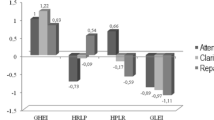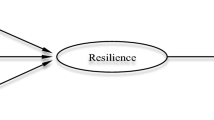Abstract
Generally, the emotional intelligence is related to a better individual adjustment and a greater self-concept, however, there are few researches that analyze how their different components of emotional intelligence influence this relationship. The objective of this study is identify different profiles in emotional intelligence based on their dimensions (Attention, Clarity, and Repair). Significant differences in self-concept domains among the previously identified profiles are also analyzed. The Trait Meta-Mood Scale-24 (TMMS-24) and the Self-Description Questionnaire-II-Short (SDQ-II-S) were administered to 1255 Chilean students. Four emotional intelligence profiles were identified using latent class analysis: a group of adolescents with a low emotional intelligence profile, a group with high scores in Emotional Attention and low scores in Emotional Repair, a group with predominance of low Emotional Attention and high Emotional Repair and, finally, a group of adolescents with high emotional intelligence. Results also revealed significant statistical differences among the profiles in most self-concept domains. Groups with high general emotional intelligence and low emotional attention and high scores in emotional repair obtained higher scores in the self-concept domains than the other groups. The results of this study contribute to knowledge of emotional intelligence and could be relevant in designing programs on emotional reasoning abilities and self-concept of secondary education students.

Similar content being viewed by others
References
Antoñanzas, J. L. (2017). The relationship between psychopathology and emotional intelligence in adolescents and adults. Procedia. Social and Behavioral Science, 237, 1093–1096. https://doi.org/10.1016/j.sbspro.2017.02.161.
Avsec, A., & Kavcic, T. (2011). Importance of the alternative five and trait emotional intelligence for communal domains of satisfaction. Psychological Topics, 20(3), 461–475.
Barchard, K. A., Brackett, M. A., & Mestre, J. M. (2016). Taking stock and moving forward: 25 years of emotional intelligence research. Emotion Review, 8(4), 289. https://doi.org/10.1177/1754073916650562.
Berenbaum, H., Raghavan, C., Le, H. N., Vernon, L., & Gómez, J. (2003). A taxonomy of emotional disturbances. Clinical Psychology: Science and Practice, 10, 206–226. https://doi.org/10.1093/clipsy.bpg011.
Bermúdez, M. P., Álvarez, I. T., & Sánchez, A. (2003). Análisis de la relación entre inteligencia emocional, estabilidad emocional y bienestar psicológico [analysis of the relationship between emotional intelligence, emotional stability and psychological well-being]. Universitas Psychologica, 2, 27–32.
Castillo-Gualda, R., Cabello, R., Herrero, M., Rodríguez-Carvajal, R., & Fernández-Berrocal, P. (2017). A three-year emotional intelligence intervention to reduce adolescent aggression: The mediating role of unpleasant affectivity. Journal of Research on Adolescence. https://doi.org/10.1111/jora.12325.
Chan, W. (2003). Dimensions of emotional intelligence and their relationships with social coping among gifted adolescents in Hong Kong. Journal of Youth and Adolescence, 32(6), 409–418.
Cheung, C. K., Cheung, H. Y., & Hue, M. T. (2015). Emotional intelligence as a basis for self-esteem in young adults. The Journal of Psychology: Interdisciplinary and Applied, 149(1–2), 63–84.
Ciarrochi, J. V., Chan, A., & Bajgar, J. (2001). Measuring emotional intelligence in adolescents. Personality and Individual Differences, 31, 1105–1119. https://doi.org/10.1016/S0191-8869(00)00207-5.
Cohen, J. (1988). Statistical power analysis for the behavioral sciences. New York: Academic Press.
Cook, E. C., Blair, B. L., & Buehler, C. (2017). Individual differences in adolescents’ emotional reactivity across relationship contexts. Journal of Youth and Adolescence, 46, 1–16. https://doi.org/10.1007/s10964-017-0673-9.
Extremera, N., & Fernández-Berrocal, P. (2004). El uso de las medidas de habilidad en el ámbito de la inteligencia emocional: Ventajas e inconvenientes con respecto a las medidas de auto-informe [the use of measures of skill in the field of emotional intelligence: Advantages and disadvantages with regard to self-report measures]. Boletín de Psicología, 80, 59–77.
Extremera, N., & Fernández-Berrocal, P. (2005). Inteligencia emocional percibida y diferencias individuales en el meta-conocimiento de los estados emocionales: Una revisión de los estudios con el TMMS [perceived emotional intelligence and individual differences in the meta-knowledge of emotional states: A review of studies with the TMMS]. Ansiedad y Estrés, 11(2–3), 101–122.
Extremera, N., Salguero, J., & Fernández-Berrocal, P. (2011). Trait meta-mood and subjective happiness: A 7-week prospective study. Journal of Happiness Studies, 12, 509–517. https://doi.org/10.1007/s10902-010-9233-7.
Fernández-Berrocal, P., & Extremera, N. (2006). Special issue on emotional intelligence: An overview. Psicothema, 18, 1–6.
Fernández-Berrocal, P., Extremera, N., & Ramos, N. (2004). Validity and reliability of Spanish modified version of the trait meta-mood scale. Psychological Reports, 94, 751–755. https://doi.org/10.2466/pr0.94.3.751-755.
Fernández-Berrocal, P., Alcaide, R., Extremera, N., & Pizarro, D. (2006). The role of emotional intelligence in anxiety and depression among adolescents. Individual Differences Research, 4(1), 16–27.
Fernández-Ozcorta, E. J., Almagro, B. J., & Sáenz, P. (2015). Inteligencia emocional percibida y el bienestar psicológico de estudiantes universitarios en función del nivel de actividad física [perceived emotional intelligence and psychological well-being of college students depending on the level of physical activity]. Cultura, Ciencia y Deporte, 10, 31–39.
Ferrándiz, C., Hernández, D., Bermejo, R., Ferrando, M., & Sáinz, M. (2012). Social and emotional intelligence in childhood and adolescence: Spanish validation of a measurement instrument. Revista de Psicodidáctica, 17(2), 309–338 doi:0.1387/Rev.Psicodidact.2814.
Guerra, J., Guerrero, E., & León del Barco, B. (2010). Relación entre apego e inteligencia emocional en adolescentes [relationship between attachment and emotional intelligence in adolescents]. Revista Electrónica de Motivación y Emoción, 13, 34–35.
Hessel, E. T., Loeb, E. L., Szwedo, D. E., & Allen, J. P. (2016). Predictions from early adolescent emotional repair abilities to functioning in future relationships. Journal of Research on Adolescence, 26(4), 776–789. https://doi.org/10.1111/jora.12229.
Inglés, C. J., Torregrosa, M. S., Hidalgo, M. D., Núñez, J. C., Castejón, J. L., García-Fernández, J. M., & Valle, A. (2012). Validity evidence based on internal structure of scores on the Spanish version of the Self-Description Questionnaire-II. The Spanish Journal of Psychology, 15, 388–398. https://doi.org/10.5209/rev_SJOP.2012.v15.n1.37345.
Inglés, C. J., Martínez-Monteagudo, M. C., Pérez-Fuentes, M. C., García-Fernández, J. M., Mercader, I., Suriá, R. y Gázquez, J. J. (2017). Emotional intelligence profiles and learning strategies in secondary school students. Educational Psychology, 37(2), 237–248.
Jiwen, L., Huang, G., Peng, K., Law, K. S., Wong, C., & Chen, Z. (2010). The differential effects of general mental ability and emotional intelligence on academic performance and social interactions. Intelligence, 38(1), 137–143.
Lischetzke, T., & Eid, M. (2003). Is attention to feelings beneficial or detrimental to affective well-being? Mood regulation as a moderator variable. Emotion, 3, 361–377. https://doi.org/10.1037/1528-3542.3.4.361.
Liu, M., & Ren, S. (2018). Moderating effect of emotional intelligence on the relationship between rumination and anxiety. Current Psychology, 37(1), 272–279.
Lubke, G. H., & Muthén, B. (2005). Investigating population heterogeneity with factor mixture models. Psycholical Methods, 10, 21–39. https://doi.org/10.1037/1082-989X.10.1.21.
Mancini, G., Andrei, F., Mazzoni, E., Biolcati, R., Baldaro, B., & Trombini, E. (2017). Brief report: Trait emotional intelligence, peer nominations, and scholastic achievement in adolescence. Journal of Adolescence, 59, 129–133. https://doi.org/10.1016/j.adolescence.2017.05.020.
Marsh, H., Ellis, L., Parada, R., Richards, G., & Heubeck, B. G. (2005). A short version of the Self-Description Questionnaire II: Operationalizing criteria for short-form evaluation with new applications of confirmatory factor analyses. Psychological Assessment, 17, 81–102. https://doi.org/10.1037/1040-3590.17.1.81.
Matalinares, M. L., Arenas, C., Dioses, A., Muratta, R., Pareja, C., Díaz, G., et al. (2005). Inteligencia emocional y autoconcepto en colegiales de Lima Metropolitana [Emotional intelligence and self-concept in students of metropolitan Lima]. Revista de Investigación en Psicología, 8, 41–55. https://doi.org/10.15381/rinvp.v8i2.4047.
Mayer, J. D., & Salovey, P. (1997). What is emotional intelligence? In P. Salovey & D. Sluyter (Eds.), Emotional development and emotional intelligence: Educational implications (pp. 3–31). New York: Perseus Books Group.
Nyland, K. L., Asparouhov, T., & Muthén, B. O. (2007). Deciding on the number of classes in latent class analysis and growth mixture modelling: A Monte Carlo simulation study. Structural Equation Modeling, 14, 535–569. https://doi.org/10.1080/10705510701575396.
Palmer, B., Gignac, G., Bates, T., & Stough, C. (2003). Examining the structure of the trait meta-mood scale. Australian Journal of Psychology, 55(3), 154–158. https://doi.org/10.1080/0004953042000298612.
Park, W., & Epstein, N. B. (2013). The longitudinal causal directionality between body image distress and self-esteem among Korean adolescents: The moderating effect of relationships with parents. Journal of Adolescence, 36(2), 403–411. https://doi.org/10.1016/j.adolescence.2013.01.002.
Perera, H. N. (2016). The role of trait emotional intelligence in academic performance: Theoretical overview and empirical update. The Journal of Psychology: Interdisciplinary and Applied, 150(2), 227–249.
Petrides, K. V., & Furnham, A. (2000). On the dimensional structure of emotional intelligence. Personality and Individual Differences, 29, 313–320. https://doi.org/10.1016/S0191-8869(99)00195-6.
Petrides, K. V., & Furnham, A. (2001). Trait emotional intelligence: Psychometric investigation with reference to established trait taxonomies. European Journal of Personality, 15, 425–448. https://doi.org/10.1002/per.416.
Resurrección, D. M., Salguero, J. M., & Ruíz-Aranda, D. (2014). Emotional intelligence and psychological maladjustment in adolescence: A systematic review. Journal of Adolescence, 37(4), 461–472. https://doi.org/10.1016/j.adolescence.2014.03.012.
Rey, L., Extremera, N., & Pena, M. (2011). Perceived emotional intelligence, self- esteem and life satisfaction in adolescents. Psychosocial Intervention, 20, 227–234. https://doi.org/10.5093/in2011v20n2a10.
Saklofske, D. H., & Austin, E. J. (2003). Factor structure and validity of a trait emotional intelligence measure. Personality and Individual Differences, 34, 707–721. https://doi.org/10.1016/S0191-8869(02)00056-9.
Salovey, P., Mayer, J. D., Goldman, S., Turvey, C., & Palfai, T. (1995). Emotional attention, clarity, and repair: Exploring emotional intelligence using the trait meta-mood scale. In J. W. Pennebaker (Ed.), Emotion, disclosure and health (pp. 125–154). Washington DC: American Psychological Association.
Salovey, P., Stroud, L. R., Woolery, A., & Epel, E. S. (2002). Perceived emotional intelligence, stress reactivity, and symptom reports: Further explorations using the Trait Meta-Mood Scale. Psychology and Health, 17, 611–662. https://doi.org/10.1080/08870440290025812.
Schreiber, J. B. (2017). Latent class analysis: An example for reporting results. Research in Social and Administrative Pharmacy, 13, 1196–1201. https://doi.org/10.1016/j.sapharm.2016.11.011.
Schutte, N., Malouff, J., Simunek, M., Hollander, S., & McKenley, J. (2002). Characteristic emotional intelligence and emotional well-being. Cognition and Emotion, 16,769-785
Schutte, N., Malouff, J., Price, I., Walter, S., Burke, G., & Wilkinson, C. (2008). Person–situation interaction in adaptive emotional functioning. Current Psychology, 27(2), 102–111. https://doi.org/10.1007/s12144-008-9027-9.
Serrano, C., & Andreu, Y. (2016). Inteligencia emocional percibida, bienestar subjetivo, estrés percibido, engagement y rendimiento académico de adolescentes [Adolescents' perceived emotional intelligence, subjective well-being, perceived stress, engagement and academic performance]. Revista de Psicodidáctica, 21(2), 357–374. https://doi.org/10.1387/RevPsicodidact.14887.
Smeets, K. C., Oostermeijer, S., Lappenschaar, M., Cohn, M., van der Meer, J. M. M., Popma, A., et al. (2017). Are proactive and reactive aggression meaningful distinctions in adolescents? A variable- and person-based approach. Journal of Abnormal Child Psycholy, 45, 1–14. https://doi.org/10.1007/s10802-016-0149-5.
Tajpreet, K., & Maheshwari, S. K. (2015). Relationship of emotional intelligence with self-esteem among adolescents. Indian Journal of Psychiatric Nursing, 10(1), 6–7.
Thayer, J. F., Rossy, L. A., Ruiz-Padial, E., & Johnsen, B. H. (2003). Gender differences in the relationship between emotional regulation and depressive symptoms. Cognitive Therapy and Research, 27, 349–364.
Váldez, J., Sáiz, J., & González-Arratía, J. (2001). El autoconcepto en niños mexicanos y chilenos [Self-concept in Chilean and Mexican children]. Revista Mexicana de Psicología, 18(2), 219–227.
Vandervoot, D. J. (2006). The importance of emotional intelligence in higher education. Current Psychology, 25(1), 4–7.
Vermunt, J. K., & Magidson, J. (2002). Latent class cluster analysis. In J. A. Hagenaars & A. L. McCutcheon (Eds.), Applied latent class analysis (pp. 89–106). Cambridge: Cambridge University Press. https://doi.org/10.1007/s12144-006-1011-7.
Xu, J. (2018). Emotion regulation in mathematics homework: An empirical study. The Journal of Educational Research, 111(1), 1–11. https://doi.org/10.1080/00220671.2016.1175409.
Zeidner, M., Matthews, G., & Roberts, R. D. (2012). The emotional intelligence, health, and well-being nexus: What have we learned and what have we missed? Applied Psychology: Health and Well-Being, 4, 1–30. https://doi.org/10.1111/j.1758-0854.2011.01062.x.
Acknowledgements
This work has been funded through project FONDECYT 11160040 of the Comisión Nacional de Investigación Científica y Tecnológica [National Commission of Scientific and Technological Researh] (CONICYT) of Chile.
Author information
Authors and Affiliations
Corresponding author
Ethics declarations
Ethical Approval
All procedures performed in studies involving human participants were in accordance with the ethical standards of the institutional and/or national research committee and with the 1964 Helsinki declaration and its later amendments or comparable ethical standards.
Conflict of Interest
On behalf of all authors, the corresponding author states that there is no conflict of interest.
Additional information
Publisher’s note
Springer Nature remains neutral with regard to jurisdictional claims in published maps and institutional affiliations.
Rights and permissions
About this article
Cite this article
Martínez-Monteagudo, M.C., Inglés, C.J., Suriá, R. et al. Emotional intelligence profiles and self-concept in Chilean adolescents. Curr Psychol 40, 3860–3867 (2021). https://doi.org/10.1007/s12144-019-00350-6
Published:
Issue Date:
DOI: https://doi.org/10.1007/s12144-019-00350-6




